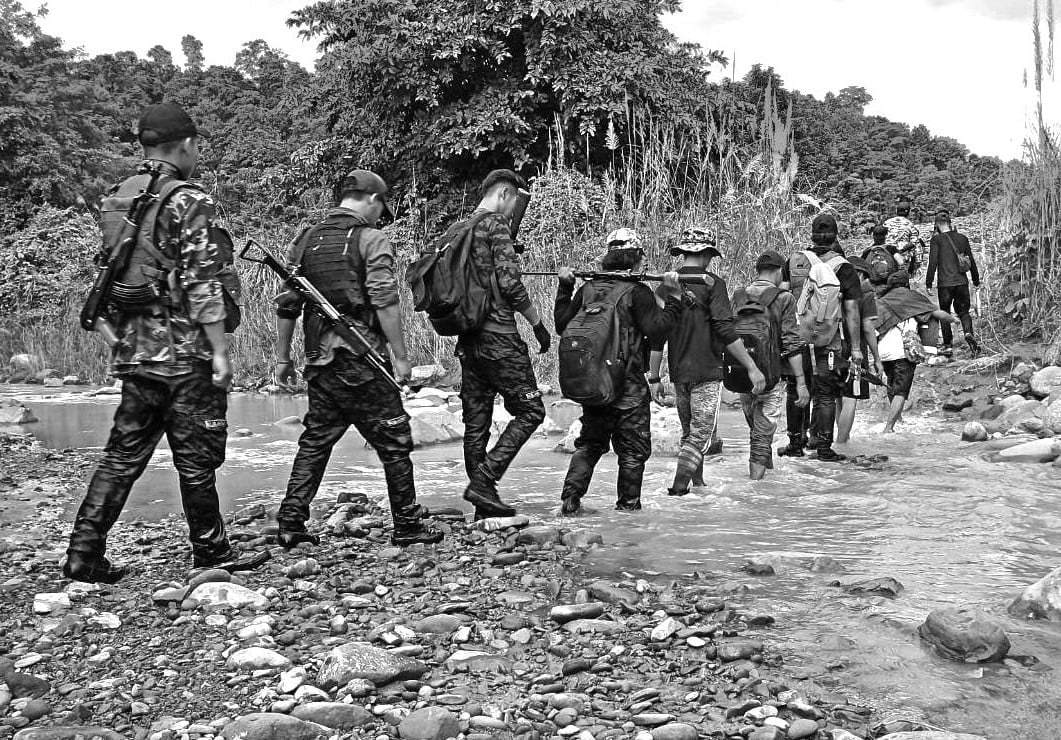Kale, one of Sagaing Region’s most developed towns, has become the second area in Burma to develop a parallel police force in light of a post-coup breakdown in law and order.
The town is attempting this in the midst of an intensifying—many would say failing—scorched earth campaign which has now seen tens of thousands of people displaced across Sagaing.
The Kalay Police Service (KPS) announced its formation over Facebook on Dec. 6 and has, according to a spokesman of the group, been created in order to fill the void that has opened in enforcing the rule of law in the southern part of Kale town.
As with other “Peoples’ Administrations”, recently launched to perform revolutionary civil service functions from Yangon to Chin State, Kale’s “peoples’ police” have started their watch in the face of demands from both the town’s People’s Defense Force and its community leaders, concerned by an unchecked rise in criminal activity as military backed police forces dedicate resources to hunting down civilians instead of crime fighting.
“We have activated a community policing system and will protect our people by the word of the law,” the spokesperson said.
KPS says it is now ready to perform fieldwork and is accepting cases brought in front of it by residents of southern Kale. The force has given itself al mandate to solve crimes in accordance with Burmese law.
Leading the force are ten CDM police officers that have defected to Kale PDF since March. The group has support of the town’s community heads and, as with Burma’s other parallel administrative bodies, will be bolstered by Kale’s sizeable PDF.
Officers are currently training local people in tactical policing through village and ward administration groups—as tens of Kale’s military-appointed administrators have either resigned or met stickier ends, the oversight of local administration is also fast returning to popular bodies independent of the junta.
“We operate by the same procedures as regional police forces according to the judicial system and will investigate cases until filing lawsuits with community leaders and the Kale PDF who will decide upon appropriate action.”
For the moment, the force says that punishment will come in the form of fines and negotiations with perpetrators of crime. Drug related crime—which has ballooned across Burma since the coup—is a case in point: the spokesperson says that drug users are handed a flat fee of K10 lakh (US$550), whilst dealers are punished on a sliding scale based on the quantity of drugs discovered.
Hinting at both the size of the vaccuum left after the junta’s assumption of power and the space left for self-governing entities to operate, the Kalay Police Service audiciously claims that it plans to build a prison in the town under the protection of both the Kale PDF and Chin State’s rapdily developing Chin National Defense Force (CNDF).
“Rule of law has totally collapsed following the coup. Nobody believes in the old police slogan ‘May I Help You’. People now have no organization to rely on if there is a crime, they have to protect themselves. Before the force, we were local PDF members. Later on, we found that a group like this is crucial for the local community. Although this further endangers our security, we believe we can do this 100 percent,” the KPS spokesperson said.
A story now common across Burma, residents of Kale are already reliant on resistance forces above the junta’s police stations. Formalising this fact with the help of CDM officers is merely the next logical revolutionary step.
“On the very first day that we established the force we got a case. Today, we received another complaint from the people. Kale’s citizens overwhelmingly welcome us—this force can be a first step to prove the value of community-based police services operating under the National Unity Government (NUG).”
The KPS says that it now plans to grow its ranks in the southern part of Kale—an area where local resistance forces dominate despite the incessant ground and air attacks launched by the military against the population of Sagaing.
In August, the Karenni State Consultative Council (KSCC) formed the KPS’s only clear predeccessor, the Kayah State People’s Police Force, with the help of scores of CDM police officers. The group is also said to be loosely overseen by the NUG.
Outside of these more formalised organizations, PDF groups across Burma have begun performing function ranging from the prosecution of drug gangs and rapists, to the capture and destruction of contraband goods, timber, and narcotics.
As Burma slips deeper into civil unrest, and as the military continues to fail to gain control of towns in rebellion, it is almost inevitable that parallel police groups similar to the KPS will arise to protect the Burmese people from ever-increasing state sanctioned brutality.



